
THE VOICE OF INTERNATIONAL LITHUANIA
|
VilNews has its own Google archive! Type a word in the above search box to find any article.
You can also follow us on Facebook. We have two different pages. Click to open and join.
|
Author Archive
Triple Helix as model for a Nordic-Baltic vision?
- Posted by - (1) Comment
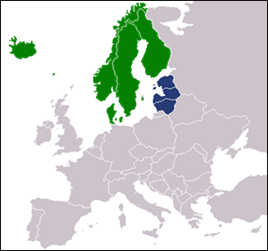
By Aage Myhre
I believe many of our readers have heard about or even studied the so-called Triple Helix model that emphasizes the need of cooperation and interaction between science, industry and government. I believe this is an extremely interesting model also for a Nordic-Baltic cooperation, as it describes an intensification of a process and a shortening of the time span between discovery and utilization, and increased reliance of industry on knowledge originated in academic institutions.
As knowledge becomes an increasingly more important part of innovation, the university (science and education) as a knowledge-producing and disseminating institution plays a larger role in business innovation. In earlier times, innovation was an activity formerly and largely performed by the industry or government, or depending upon the social system, a bilateral interaction between these two institutional spheres. In a knowledge-based economy, however, the university becomes a key element of the innovation system both as human capital provider and seedbed for new firms. The three institutional spheres (public, private, and academic) – that formerly operated at arms’ length – are increasingly interwoven with a spiral pattern of linkages emerging at various stages of the innovation and industrial policy-making process. Furthermore, in addition to these institutional linkages among spheres, each sphere may take up the role of the other.
A triple helix of university-business-government relations transcends previous models of institutional relationships, whether socialist (No. 1) or laissez-faire (No. 2), in which either the polity or economy predominated and with the knowledge playing a subsidiary role.

Triple Helix 1: The communist model.
An etatist or socialist model of university-industry-government relations
(where the Baltic States were during the Soviet period).

Triple Helix 2: The laissez-faire model.
A laissez-faire model of university-industry-government relations
(where the Baltic States very much are today).

Triple Helix 3: The Scandinavian model.
This triple helix model is an attempt to account for a new configuration of institutional forces emerging within innovation systems (a stage the Nordic countries to a quite high degree have reached), and I believe this is a good model for joint cooperation and innovation between the Nordic and the Baltic States.

Triple Helix 4: The endless transition model.
Triple Helix no. 4 is one in which the overlay of communications and expectations at the network level guides the reconstructions of institutional arrangements. It is not expected to be stable and the sub-dynamics in the innovation process are continuously reconstructed through discussions and negotiations. What is considered as ‘industry’, what as ‘market’ cannot be taken for granted. Each ‘system’ is defined and can be redefined as the research project is designed. Thus, the triple helix hypothesis is that systems can be expected to remain in an endless transition.
This model indicates that innovation and cooperation should take place across sectors and country boundaries, for example that a university in Sweden very well could work with a business venture in Lithuania, and I believe the combination of Triple Helix 3 and 4 is a good solution for cooperation and collaboration within the Baltic-Nordic region as this will lead to increased integration and development that will give us advantages ahead of most other regions of the world.
My experience from Lithuania does, however, not make me too optimistic about the situation for cross-sector cooperation. I was, for example, asking the General Director of Omnitel (the leading mobile phone operator in Lithuania) about the situation for higher education within technology. His answer was that one single word would be description enough; „It‘s bad!“
And a few years ago I asked the General Director of the Libra Group (a leading Lithuanian company within wood processing) to tell me what kind of support and help he had from the authorities in his important business. His short answer was: „I don‘t expect anything from them, and I‘m happy as long as they don‘t create problems for me“.
- Bookmark :
- Digg
- del.icio.us
- Stumbleupon
- Redit it
- Posted by - (0) Comment
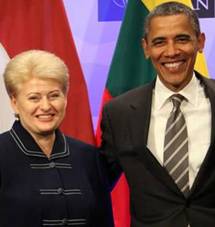
The complicated
Obama - Grybauskaitė
relationship
Read more…
__________________________
Grybauskaitė probably would be more successful in securing an invitation to visit Kremlin than the White House

Stan Backaitis
Washington, D.C.
__________________________
Only way the Lithuanian president would see the inside of the White House would be in a tourist tour

Richard Vitkauskas,
New York
__________________________
Not some friends’ dinner parties where she can choose to go or not

Nellie Vin,
New York
- Bookmark :
- Digg
- del.icio.us
- Stumbleupon
- Redit it
- Posted by - (0) Comment
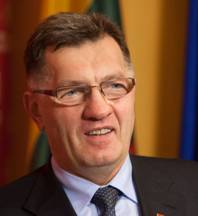
As Lithuania's prime minister,
A. Butkevičius plans first visits to Latvia and Poland
Asked to comment on President Dalia Grybauskaitė's decision not to go to Warsaw on Sunday when Poland marks the Independence Day, Butkevičius refused to comment but added that he was of the opinion that "relations with Poland need to be improved and warmed up." "It would be incorrect for me to comment on the president's decision. In the end, it’s the president's opinion and I respect that," the social democratic leader said.
"My position is that we need to improve and warm up our relations with Poland and I believe we could do a lot and reach a lot with such a neighbor as Poland which is very big and I see it as a strategic partner in implementing many common projects and as a partner in looking for agreement even at certain meetings of the Council, and we could do a lot of things by supporting each other," Butkevičius said.
It was announced on Monday that President Grybauskaitė would not attend Poland's Independence Day commemoration on Sunday. The president's spokeswoman Daiva Ulbinaitė told BNS Grybauskaitė would not attend the Sunday commemoration due to urgent internal policy-related issues.
"Due to urgent internal policy-related issues, the president will not go to Poland on 11 November. Sending her congratulation to Polish President Bronislaw Komorowski on the occasion of the Independence Day, the president invited the Polish counterpart to discuss bilateral and regional cooperation issues important for people of Lithuania and Poland at a working meeting in early December or at any time convenient for the Polish president," Ulbinaitė told BNS on Monday.
Read more...
- Bookmark :
- Digg
- del.icio.us
- Stumbleupon
- Redit it
- Posted by - (0) Comment
The complicated Obama -
Grybauskaitė relationship
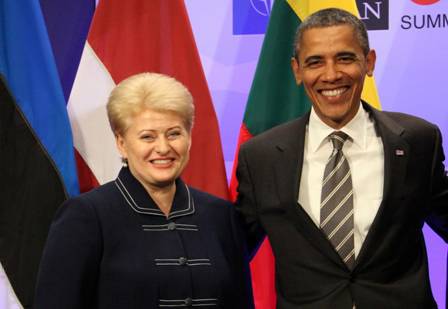
In 2010, Lithuanian President Dalia Grybauskaitė openly disagreed with
Obama on a new arms reduction plan, claiming it harmed Lithuanian
security, and in a rather shocking move refused to take part in
a dinner with Obama in Prague. Grybauskaitė was the only
invited president who refused to meet with Obama.
In April 2010, Barack Obama and his Russian counterpart Dmitry Medvedev signed a new arms reduction treaty in Prague, primarily with regards to the Eastern European missile defense system that had been planned by the George W. Bush administration.
After the signing, President Obama invited the presidents of Lithuania, Latvia, Estonia, and Romania, as well as the prime ministers of Poland, Czech Republic, Bulgaria, Croatia, Hungary, Slovakia and Slovenia to attend a dinner with him in Prague.
Lithuanian President Dalia Grybauskaitė openly disagreed with Obama on the new reduction plan, claiming it harmed Lithuanian security, and in a rather shocking move refused to take part in the dinner in Prague. Grybauskaitė was the only invited president who refused to meet with Obama.
- Bookmark :
- Digg
- del.icio.us
- Stumbleupon
- Redit it
- Posted by - (6) Comment
The complicated Obama -
Grybauskaitė relationship

In 2010, Lithuanian President Dalia Grybauskaitė openly disagreed with
Obama on a new arms reduction plan, claiming it harmed Lithuanian
security, and in a rather shocking move refused to take part in
a dinner with Obama in Prague. Grybauskaitė was the only
invited president who refused to meet with Obama.
In April 2010, Barack Obama and his Russian counterpart Dmitry Medvedev signed a new arms reduction treaty in Prague, primarily with regards to the Eastern European missile defense system that had been planned by the George W. Bush administration.
After the signing, President Obama invited the presidents of Lithuania, Latvia, Estonia, and Romania, as well as the prime ministers of Poland, Czech Republic, Bulgaria, Croatia, Hungary, Slovakia and Slovenia to attend a dinner with him in Prague.
Lithuanian President Dalia Grybauskaitė openly disagreed with Obama on the new reduction plan, claiming it harmed Lithuanian security, and in a rather shocking move refused to take part in the dinner in Prague. Grybauskaitė was the only invited president who refused to meet with Obama.
After becoming Lithuania's president in 2009, Grybauskaitė wasted no time defining her leadership. "Yes, you have to be a strict and loud partner if you want to be heard in the conversation," she told the Associated Press in a 2011 interview.
"Lithuania is not used to a straightforward, terse, forceful way of making statements. I admit using this style in pushing NATO defense plans for the Baltic States," she said, referring to U.S. cables released by WikiLeaks earlier this year, showing that NATO in January 2010 privately decided to expand a NATO defense plan for Poland to also cover Estonia, Latvia and Lithuania.
"I am afraid that if I had chosen a different tone, Lithuania and its neighbours would be still waiting another six years for these," she said to the Associated Press, giving herself credit for USA’s and NATO’s new strategy as revealed by WikiLeaks.
In 2011 President Obama invited the same East European state leaders for a dinner in Poland, and this time President Grybauskaite accepted the invitation, a move presumably leading to a warmer relationship between the two presidents.
At the working dinner the Lithuanian president underlined that NATO anti-missile defense must cover all the NATO allies. According to the president, NATO-Russian relations are particularly important for Lithuania owing to its strategically special location on the boundary of the Alliance’s territory. She said the agreement reached in the NATO Lisbon Summit must not be changed and must not become the object of negotiations with Russia.
It still is little known about how President Grybauskaite’s ‘reflections’ vs. the Obama administration in 2010 and NATO in 2011 were perceived by the said parties. We can only hope they were not given too much weight and that the relationships with Lithuania have not been harmed. Her acceptance of last year's invitation from
Obama, and the absence of new provocative statements, suggest that she has adopted a more conciliatory
and diplomatic style and line.
The right to disagree and discuss any topic should always remain free and open, but I think our president would be better off by following more recognized protocol procedures when such delicate issues are to be discussed at high international level.
To have a best possible relationship with the U.S. and the new Obama administration will be important for Lithuania, and one can only hope that his reelection will come to represent another positive step towards improved dialogue and cooperation also between Lithuania and the United States.
Aage Myhre, Editor-In-Chief
- Bookmark :
- Digg
- del.icio.us
- Stumbleupon
- Redit it
- Posted by - (4) Comment
Obama is very popular
all over the world
U.S. re-elected president enjoys great confidence around the world. Let us hope that this confidence can contribute to less tension and increased human understanding between peoples and nations over the four years that are now ahead of us.
If the world outside USA had a say, President Barack Obama would have won with very clear margins over Mitt Romney, according to surveys presented in several world news media ahead of the U.S. elections. See below.
Unfortunately, there are no numbers available for Lithuania.
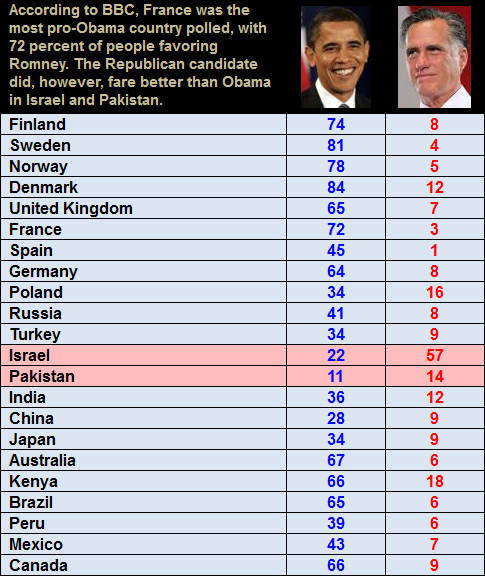
Read more at:
http://www.bbc.co.uk/news/world-us-canada-20008687
http://rt.com/politics/obama-romney-election-us-russia-putin-576/
http://www.jpost.com/DiplomacyAndPolitics/Article.aspx?id=289600
http://www.aftenposten.no/nyheter/uriks/usavalg/Verden-ville-valgt-Obama-7037530.html
World reactions to Obama’s reelection
From Australia, to China, Egypt and Russia ... hear people say "Obama" in different accents ... and watch some of them offer their more in-depth assessment of his second presidential election win
Viewpoints from around the world on Barack Obama's US election triumph, in which the incumbent democrat president held off the challenge from Republican rival Mitt Romney. The reaction was generally positive on the streets of Moscow, Beijing and Tokyo - though more mixed in countries such as Iraq and Egypt.
- Bookmark :
- Digg
- del.icio.us
- Stumbleupon
- Redit it
- Posted by - (0) Comment

Opinion: JP Hochbaum, Chicago:
The austerity trap
of the Eurozone
Below some of the replies. Read the op-ed and related comments HERE.
__________________________
for further opinions and discussions
__________________________
I can only congratulate Mr. JP Hochbaum
for his bold article about the dire consequences that the EU austerity program, largely driven by the intransigent German Chancellor Angela Merkel. All over Europe, first ordinary people and now mainstream politicians and elected government officials are demanding a reversal of the austerity policies that have shaken the European Union at its core.
Boris Bakunas
__________________________
Very good article and an excellent reply
Lithuania is a small but smart and strong country. It raised its voice against the Soviet oppressor and came out on top. It can and should use its intelligence and strength to make itself stronger and also make the EU stronger.
Bernard Terway
__________________________
This is one of the most informative articles I've ever read
on the subject of what's going on in the Lithuanian homeland today. If I were wearing one, I'd tip my hat to Mr. Hochbaum.
Gene Christianson
__________________________
Ya, Australia & China did huge stimulus packages
& they have the best economies while others that tried austerity burned (Latvia, Estonia, Greece, Portugal, & UK & Ireland did austerity & all worsened).
Jason Hun
__________________________
An interesting and informative article. I have also advocated that Lithuania may be better off in leaving the EU
However, it would have little chance of survival if left to go it alone. I also agree that austerity measures have had their deleterious effect on the populace. However, Lithuania's GDP grew at roughly 2.5% in 2012, and is projected to grow at 3.4% (Bank of Lithuania projections) in 2013. Therefore, the much criticized austerity measures appear to have enabled Lithuania to turn the corner economically.
Jon Plakatis
__________________________
Nice attempt to analyze the situation, but the use of terms and the interpretation of facts is completely wrong
Austerity started in 2008-09, not 2004, so emigration could never be its result. Huge debt is permissible to large economies like the US or Japan, but disastrous to tiny economies like Lithuania. The same with an unstable currency. The inflation 'ceiling' is a condition for joining the Eurozone, not the EU per se. In fact, right after the EU entry Lithuania experienced unprecedented growth, and inflation was largely driven by remittances from emigrees and cheap loans. Without the EU, Lithuania would look like Albania or Moldova, not like Switzerland. In today's global economy, such small states never have a real sovereignty - unless, of course, they are protectionist, but I don't think the author wants Cuba here.
Daiva Repečkaitė
- Bookmark :
- Digg
- del.icio.us
- Stumbleupon
- Redit it
- Posted by - (0) Comment
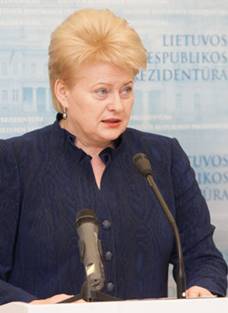
Lithuanian president goes to court over vote fraud
Lithuania's political standoff intensified Tuesday after the president vowed to turn to the nation's highest court to assess whether last month's parliamentary election should be invalidated due to allegations of widespread voting fraud.
President Dalia Grybauskaite triggered the crisis last week after she said that the Labor Party should not be part of the next government given that prosecutors and election officials have accused party leaders of buying votes.
The Labor Party, which finished third in the election, on Tuesday signed an agreement to create a center-left coalition with the Social Democrats and the populist Order and Justice. Together they would control a majority of seats in the next legislature, which will likely convene in December.
But Grybauskaite, who has the power to approve the coalition, has said she will not consider any government deal until she receives a final evaluation on the election from the Constitutional Court, according to spokeswoman Daiva Ulbinaite.
The president is expected to submit the petition to the court on Wednesday. The court must respond by Saturday.
Two Labor Party members are accused of vote-buying, while the party's Russian-born party leader, Viktor Uspaskich, is under criminal investigation for his alleged role in fraudulent party financing that dates back several years.
Read more…
- Bookmark :
- Digg
- del.icio.us
- Stumbleupon
- Redit it
- Posted by - (0) Comment
- Bookmark :
- Digg
- del.icio.us
- Stumbleupon
- Redit it
- Posted by - (0) Comment
 |
To those who still believe that the EU can use cutbacks as a mean to achieve growth, the first major study of the policies that have been pursued in recent years, shows that the effect has been the opposite. Austerity policy has only made matters worse. Read today’s article from ‘The Guardian’ and the below opinion posts. |
 Opinion: JP Hochbaum, Chicago
Opinion: JP Hochbaum, Chicago
The austerity trap
of the Eurozone

The effects of the austerity medicine that Lithuanians
have been forced to swallow is brutal
Lithuania is in an economic conundrum. The politicians want to be a part of the EU to become more viable economically and to separate from Russia. At least that is what I take from this as a United States citizen, as I can only speculate from what I read and what other Lithuanians tell me. But the entrance into the EU takes away the ability for countries like Lithuania to control their own economy. They are forced to go through austerity and dismantle their energy output, in order to please the EU powers that be. It is time for Lithuania to set a shining example for Eastern Europe and become an economic power in their own right by shedding the shackles that the EU imposes on them.
Lithuania would be wise to separate from the EU and to remain a sovereign country, both monetarily and governmentally.
- Bookmark :
- Digg
- del.icio.us
- Stumbleupon
- Redit it
- Posted by - (11) Comment
 Opinion: JP Hochbaum, Chicago
Opinion: JP Hochbaum, Chicago
The austerity trap
of the Eurozone

The effects of the austerity medicine that Lithuanians
have been forced to swallow is brutal
Lithuania is in an economic conundrum. The politicians want to be a part of the EU to become more viable economically and to separate from Russia. At least that is what I take from this as a United States citizen, as I can only speculate from what I read and what other Lithuanians tell me. But the entrance into the EU takes away the ability for countries like Lithuania to control their own economy. They are forced to go through austerity and dismantle their energy output, in order to please the EU powers that be. It is time for Lithuania to set a shining example for Eastern Europe and become an economic power in their own right by shedding the shackles that the EU imposes on them.
Lithuania would be wise to separate from the EU and to remain a sovereign country, both monetarily and governmentally. Being monetarily sovereign would allow Lithuania to control their economy and not be strong armed by the EU into implementing further austerity. Monetary sovereignty eliminates the risks of a debt crisis and could be used to quickly eradicate recessions and joining the EU eliminates that option and ability. So in order for Lithuanians to avoid further austerity they need to remove the powers that are forcing it on them, the EU. Austerity has led to large emigration, wage reductions, and an increase in poverty.
From 2001 all the way up to 2009 Lithuania’s population was declining on average by around half a percentage point. Then in 2010 that number jumped up to 1.5- an increase of 200%. This population decline is a direct result of austerity, and has become worse because the options for Lithuanian citizens to better themselves are reducing.
The effects of the austerity medicine that Lithuanians have been forced to swallow is brutal. Eironline wrote:
“Without consulting the trade unions, the government decided on 17 June 2009 to cut the basic monthly salary in the public sector. The basic monthly salary is applied as a reference to determine the salaries of public sector employees such as tutors, social workers, librarians and cultural workers. The basic weekly salary was to be reduced accordingly from LTL 128 (about €37 as at 30 July 2009) to LTL 115 (€33). The pay cut was due to enter into force on 1 August and would have affected about 230,000 public sector employees, most of whom are already relatively low paid.”
As Eironline show, you don’t improve an economy by reducing its citizen’s ability to buy and save. That just makes the economy worse.
Lithuanian suicide rates also tell us about the real effects of austerity. During the worst economic collapse in recent history Lithuania’s suicide rate peaked at 61.3 per 100,000, and then dropped the next year to 53.6, which is expected after a sharp decline in the economy. Typically things bottom out like and then improve. But since then we have seen the suicide rates (post austerity) creep up again and the rate stands now at 54.6. If austerity is supposed to work why are suicide rates rising?
In order for Lithuania to expand and get back to a growing population, rising wages, and higher employment, they have to experience some inflation to get there. But the EU won’t allow them to remain with a rate of inflation above 4.2%. So this means that Lithuania has to slow down the growth of their economy, while still in a recession, in order to meet EU requirements. The two countries that are growing the fastest, China and Argentina, are also experiencing double digit inflation. But they are reducing poverty levels and increasing the size of their middle class. The EU doesn’t realize that growing an economy occasionally results in some “healthy” inflation.
Many of the EU leaders and other politicians are trying to take Lithuania as a shining example of austerity by pointing out their declining unemployment rate. There is a reason why only politicians see this, they are better at selling their ideas than they are at analyzing data. A great site for economic news and information, New Economic Perspectives, debunks the myth that austerity helped the unemployment rate:
“Contrast anemic IMF economic growth forecast for the next 6-8 years with disastrous social consequences of internal devaluation policies.
Consider that Lithuania almost tripled its level of unemployment in Lithuania from 5.8% in 2008 to 17.8% in 2010. Although by 2011 unemployment began to decline to 15.6%, this happened not as much because of creation of new jobs, but because of mass outmigration from Lithuania.
Public sector wages were cut but 20-30 and pensions by 11 percent, which in combination with growing unemployment let to dramatic increasing in poverty.
If in 2008 there were 420 thousand or 12.7% of population living in poverty, by 2009 poverty rate increased to 20.6%. Although by 2010 there was a .4% decrease in the number of poor to 670 thousand, the decrease was caused mostly by downward change in measuring the poverty.
Various measures of quality of life and well-being deteriorated even further indicating prevalence of deep pessimism, loss of social solidarity, trust, and atomization of a society.”
If Lithuania were to depeg their currency and become monetarily sovereign, they would be able to hire their entire unemployment population via a job guarantee bill, invest heavily in their own energy (so they aren’t forced to import it from Russia), and become an economic power in their own right.
- Bookmark :
- Digg
- del.icio.us
- Stumbleupon
- Redit it
- Posted by - (0) Comment
 Opinion: Irene Simanavicius, Toronto:
Opinion: Irene Simanavicius, Toronto:
Invite Brazil
to Tea

Three decades ago, for example, the Brazilian government gave aircraft manufacturer Embraer lucrative contracts and various subsidies, recognizing that it could potentially find a niche in producing smaller, regional aircraft. Private investors were dubious of Embraer’s chances. Had it relied solely on private investment, the company probably would have failed; instead, it flourished, becoming the world’s biggest maker of regional jets.
My question is... What is Lithuania going to do to get top tier corporations to take Lithuania seriously? Lithuania needs to get on board especially now with the slow economic temperature in Europe, we need investors that will TRUST Lithuania. We need Lithuania to trust Lithuania. We need to be investing in the country, providing jobs for Lithuanians, introduce some level of security for Lithuania.
Lithuania NEEDS a strong economy!
- Bookmark :
- Digg
- del.icio.us
- Stumbleupon
- Redit it
- Posted by - (0) Comment
 Opinion: Irene Simanavicius, Toronto:
Opinion: Irene Simanavicius, Toronto:
Invite Brazil
to Tea

Three decades ago, for example, the Brazilian government gave aircraft manufacturer Embraer lucrative contracts and various subsidies, recognizing that it could potentially find a niche in producing smaller, regional aircraft. Private investors were dubious of Embraer’s chances. Had it relied solely on private investment, the company probably would have failed; instead, it flourished, becoming the world’s biggest maker of regional jets.
My question is... What is Lithuania going to do to get top tier corporations to take Lithuania seriously? Lithuania needs to get on board especially now with the slow economic temperature in Europe, we need investors that will TRUST Lithuania. We need Lithuania to trust Lithuania. We need to be investing in the country, providing jobs for Lithuanians, introduce some level of security for Lithuania.
Lithuania NEEDS a strong economy!
Combining government support with a mandate for profitability and independent management has yielded successful businesses in other countries like Brazil for instance Brazil is perhaps the best current example of how a country can build innovative industries. Successive Brazilian governments have intervened—with incentives, loans, and subsidies—to promote industries that otherwise would have needed long-term private investment to make them competitive with U.S. and European rivals. At the same time, Brazil preserved strong, independent management of state-backed firms, ensuring they did not become political boondoggles.
Three decades ago, for example, the Brazilian government gave aircraft manufacturer Embraer lucrative contracts and various subsidies, recognizing that it could potentially find a niche in producing smaller, regional aircraft. Private investors were dubious of Embraer’s chances. Had it relied solely on private investment, the company probably would have failed; instead, it flourished, becoming the world’s biggest maker of regional jets.
Similarly, by investing in deep-sea drilling technology, Petrobras, a state oil company with an independent management board, has made itself competitive with multinational giants such as Chevron, Shell, and BP.
Three decades ago, for example, the Brazilian government gave aircraft manufacturer Embraer lucrative contracts and various subsidies, recognizing that it could potentially find a niche in producing smaller, regional aircraft. Private investors were dubious of Embraer’s chances. Had it relied solely on private investment, the company probably would have failed; instead, it flourished, becoming the world’s biggest maker of regional jets. Similarly, by investing in deep-sea drilling technology, Petrobras, a state oil company with an independent management board, has made itself competitive with multinational giants such as Chevron, Shell, and BP.
By picking industries it could dominate and supporting them even when private capital was scarce, Brazil has created internationally competitive companies in a range of industries, from aerospace to clean energy. Today the government often backs companies as a minority shareholder or through indirect vehicles, allowing for corporate independence while still helping companies make important investments in research and skills. Many of Brazil’s state-backed companies have survived the global slump far better than multinationals because they can rely on government assistance to see them through
Singapore has used government incentives to push companies to move into industries such as solar and other clean energies, which, although not necessarily profitable now, will be the emerging technologies of this century.
Some smaller countries may respond by either curbing their government access to their markets or by intervening heavily in their own economies. Neither of these solutions is really viable. As the biggest companies expand their global operations, their technology, connections, and capital will be almost impossible to keep out. And aging, heavily indebted nations face huge challenges reforming their entitlement programs: They’re in no position to pour the amount of resources into companies that Brazil, India, or China can.
Singapore offers one model of how the state can intervene in the economy without stifling entrepreneurship. The government there identifies industries that are critical to innovation and future technology, helps provide initial angel investments in small companies, tries to woo talented men and women from other countries who work in these industries, and uses state resources to ensure that universities focus on basic science research that will yield dividends in the future.
The government there identifies industries that are critical to innovation and future technology, helps provide initial angel investments in small companies, tries to woo talented men and women from other countries who work in these industries, and uses state resources to ensure that universities focus on basic science research that will yield dividends in the future.
Instead of trying to prevent—or worse, dismiss this altogether— U.S. and European companies and governments would do better to learn from them.
All these strategies require only modest state investment, and nothing on the scope of China’s or Brazil’s large-scale lending to state companies.
Perhaps we should invite the Brazilians for tea!
- Bookmark :
- Digg
- del.icio.us
- Stumbleupon
- Redit it
- Posted by - (0) Comment
“My writing is about Vilna,” says Abraham Karpinovitch in a new film
Thieves, whores, and
gangsters who supplied
color to our lives
By Ellen Cassedy
“My writing is about Vilna,” says Abraham Karpinovitch in a new film – “not about the Vilna Gaon [the renowned rabbi of 18th-century Vilnius] or about the clergy or the intelligentsia, but about the thieves, whores, racketeers, and gangsters who supplied color to our lives.”
The film is the latest in a series about Jewish writers directed by Boris Sandler, the editor of the New York-based Yiddish newspaper Forverts. Sandler presented the film, in Yiddish with English subtitles, at the Lithuanian Embassy in Washington, D.C., on October 18, under the auspices of Yiddish of Greater Washington.
- Bookmark :
- Digg
- del.icio.us
- Stumbleupon
- Redit it
- Posted by - (2) Comment
“My writing is about Vilna,” says Abraham Karpinovitch in a new film
Thieves, whores, and gangsters
who supplied color to our lives
By Ellen Cassedy
“My writing is about Vilna,” says Abraham Karpinovitch in a new film – “not about the Vilna Gaon [the renowned rabbi of 18th-century Vilnius] or about the clergy or the intelligentsia, but about the thieves, whores, racketeers, and gangsters who supplied color to our lives.”
The film is the latest in a series about Jewish writers directed by Boris Sandler, the editor of the New York-based Yiddish newspaper Forverts. Sandler presented the film, in Yiddish with English subtitles, at the Lithuanian Embassy in Washington, D.C., on October 18, under the auspices of Yiddish of Greater Washington.
Before World War II, Vilnius was home to 60,000 Jews. Among them were not only scholars, writers, merchants, and political activists – but also a vibrant underclass.
The Vilnius-born Karpinovitch (1913-2004) set about recording and memorializing this multi-colored underworld. To his chosen task, he brought a finely tuned ear for slang, an eye for evocative detail, a talent for blending fact and fiction, and an abiding affection.
As the son of a Jewish theatre director, Karpinovitch was exposed early to the treasures of stage culture. “I feasted on a rich stew of folk cuisine,” he says, “and that’s how I became a writer.”
Before the outbreak of World War II, Karpinovitch immigrated to the Soviet Union, where he was arrested and sent to Siberia. After the war, he settled in Israel. For more than 30 years he managed the Israel Philharmonic Orchestra. “I wore a suit and tie all day,” he says, “then sat down and wrote about the Vilna underground.”
Sandler interviewed and taped Karpinovitch and 20 other Yiddish writers in Israel in 1995.
“Tall Tamare,” a story translated into English by Helen Mintz, tells the tale of a Vilna streetwalker who helps to organize a union for her fellow brothel employees, then behaves with striking dignity at the killing field of Ponar (Paneriai) in 1941. The writer’s work has been translated from Yiddish into Hebrew, Polish, Russian, German, and Lithuanian.
As the chronicler of a bygone world, Sandler said, Karpinovitch “was able to invoke in his own way the mourner’s prayer for his beloved compatriots. He brought his fellow Jews to life so that we, their surviving descendants, could see ourselves in them and remember them.”
Sandler’s film invites viewers to stroll through the old Jewish quarter in present-day Vilnius, where, the director says, “in the streets and alleys and walls and buildings, shadows are looking at us.”
|
|
Her book, We Are Here: Memories of the Lithuanian Holocaust, will appear in Lithuanian in 2013 under the title Mes esame čia: Atsiminimai apie holokaustą Lietuvoje. |
- Bookmark :
- Digg
- del.icio.us
- Stumbleupon
- Redit it
- Posted by - (1) Comment

New Lithuanian
government vetoed
by President
Was her decision correct, democratic?
WHAT DO YOU THINK?
_____________________________

Rimas Pileika I thought it showed a lot of guts. Keep the light shining on the truth with respect to all corruption.
_____________________________

Vyto Be She should stand up to the vote fraud. But since her credibility is quite low, one could suspect she's merely trying to co-opt and integrate the winners into the corrupt establishment, diluting their power...
_____________________________

Daina Vasiliauskas If she is certain of the fact, adopted the correct measure because voter fraud already puts the opponent unable to govern.
- Bookmark :
- Digg
- del.icio.us
- Stumbleupon
- Redit it
VilNews e-magazine is published in Vilnius, Lithuania. Editor-in-Chief: Mr. Aage Myhre. Inquires to the editors: editor@VilNews.com.
Code of Ethics: See Section 2 – about VilNews. VilNews is not responsible for content on external links/web pages.
HOW TO ADVERTISE IN VILNEWS.
All content is copyrighted © 2011. UAB ‘VilNews’.

 Click on the buttons to open and read each of VilNews' 18 sub-sections
Click on the buttons to open and read each of VilNews' 18 sub-sections 

















.jpg)



